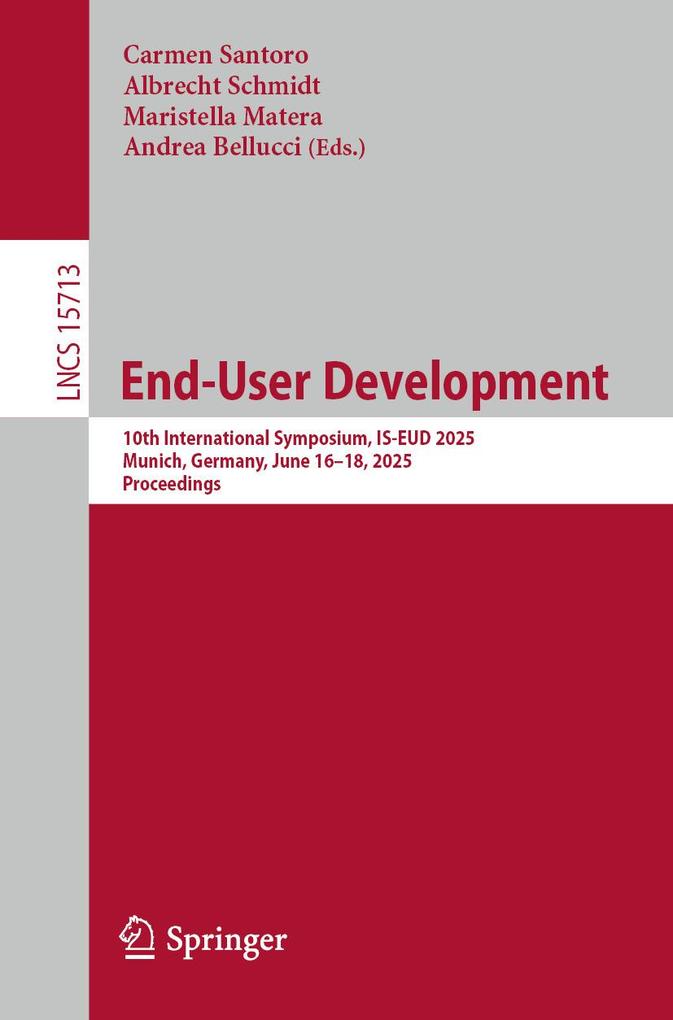
Sofort lieferbar (Download)
This book constitutes the refereed proceedings of the 10th International Symposium on End-User Development, IS-EUD 2025, held in Munich, Germany, during June 16-18, 2025.
The 13 full papers and 8 short papers included in this book were carefully reviewed and selected from 25 submissions. These papers have been organized under the following topical sections: Automation, Sustainability, and Smart Environments; Democratizing AI and Programming; AI for End-User Empowerment: Personalization andWellbeing; and EUD Principles, Methodologies, and Participatory Cultures.
Inhaltsverzeichnis
. - Automation, Sustainability, and Smart Environments.
. - An EUD Approach to Creating Feasible and Energy-saving Automations for Smart Homes.
. - End-User Customization of Trigger-Action Rules through Fine-Tuned LLMs.
. - Explaining Problems in Daily Automations with ExplainTAP.
. - Conversational Rule Creation in XR: User s Strategies in VR and AR Automation.
. - From User Needs to Smart Ecosystems through LLMs: the Smartifier Case Study.
. - Assembly Workers as PLC Programmers: What End Users Need to Understand about Low-Code Development Platforms.
. - Democratizing AI and Programming.
. - Fostering Novice Collaboration in ML-Based System Design Through Visual Languages and Touch Interfaces.
. - Visual and Textual Language Synchronization for End-User Programming Environments.
. - OMNI: an EUD tool for Ontological Multisensory Navigation Interface.
. - Explanation-Driven Interventions for Artificial Intelligence Model Customization: Empowering End-Users to Tailor Black-Box AI in Rhinocytology.
. - Evaluating Visual Prompting Modalities for Generative AI-Assisted UI Design.
. - AI for End-User Empowerment: Personalization andWellbeing.
. - Beyond Usability: IntroducingWellbeing-Driven End-User Development Design.
. - AI-Assisted Cognitive Support for Caregivers: A RAG and EUD Framework for Geriatric Care.
. - From Digital Self-Control Apps to iOS Shortcuts: Enabling Privacy-Centric Wellbeing Research Without Code.
. - Empowering End Users to Design for Their Digital Self-Control.
. - Leveraging EUD and Generative AI for Ethical Phishing Campaigns.
. - Classifying User Motivation in Interactions.
. - EUD Principles, Methodologies, and Participatory Cultures.
. - Mindsets, Cultures, and Technologies in Support of End-User Development.
. - Assessing Computational Thinking Skills through Artefacts: the Case of ModeLLer.
. - Scenario-Based Design Tools: End-User Reflections to Requirements.
. - Defining Classes and Semantic Relationships from User Scenarios through a Heuristic Approach.
Produktdetails
Erscheinungsdatum
12. Juni 2025
Sprache
englisch
Seitenanzahl
346
Dateigröße
36,42 MB
Reihe
Lecture Notes in Computer Science
Herausgegeben von
Carmen Santoro, Albrecht Schmidt, Maristella Matera, Andrea Bellucci
Verlag/Hersteller
Kopierschutz
mit Wasserzeichen versehen
Produktart
EBOOK
Dateiformat
PDF
ISBN
9783031954528
Entdecken Sie mehr
Bewertungen
0 Bewertungen
Es wurden noch keine Bewertungen abgegeben. Schreiben Sie die erste Bewertung zu "End-User Development" und helfen Sie damit anderen bei der Kaufentscheidung.









